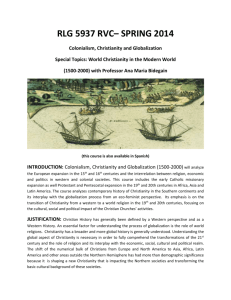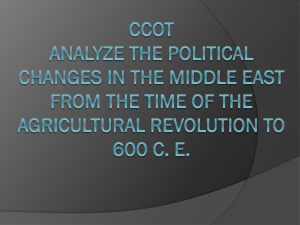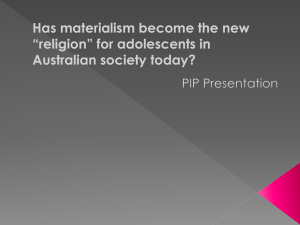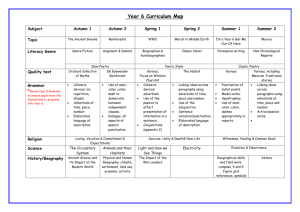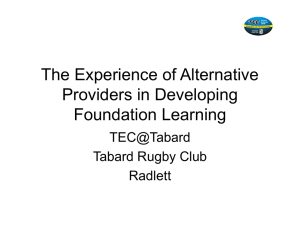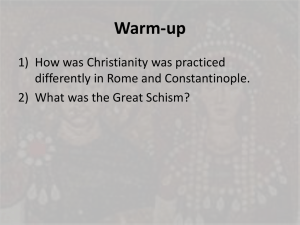Sermon 19th May 2013 - St John`s in the City
advertisement
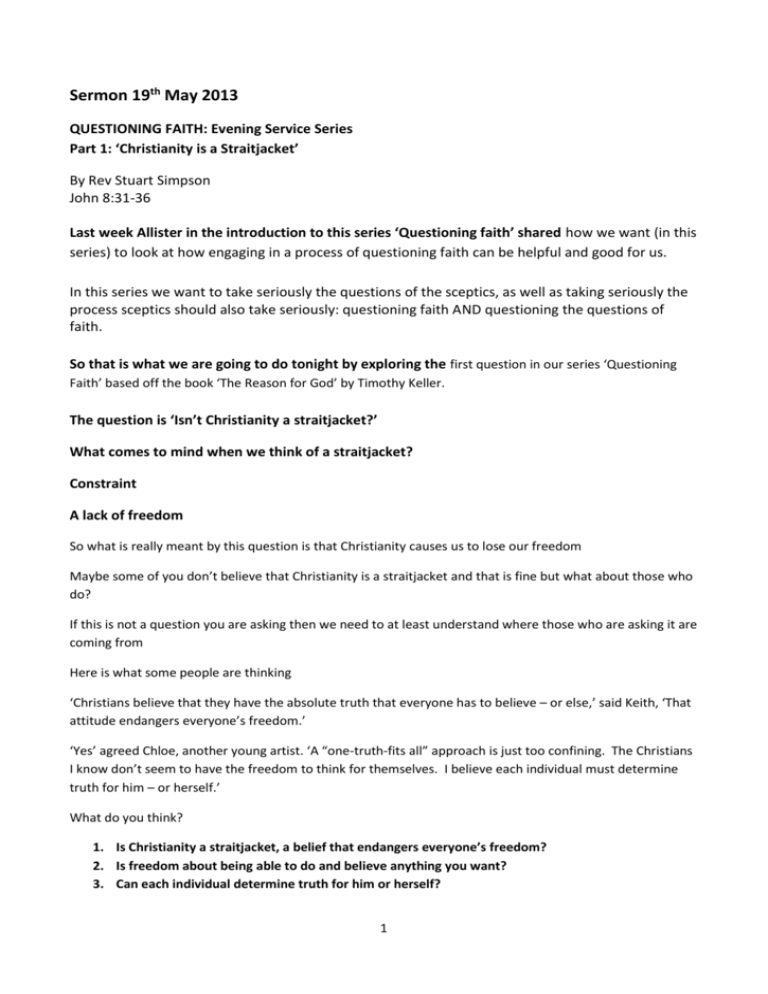
Sermon 19th May 2013 QUESTIONING FAITH: Evening Service Series Part 1: ‘Christianity is a Straitjacket’ By Rev Stuart Simpson John 8:31-36 Last week Allister in the introduction to this series ‘Questioning faith’ shared how we want (in this series) to look at how engaging in a process of questioning faith can be helpful and good for us. In this series we want to take seriously the questions of the sceptics, as well as taking seriously the process sceptics should also take seriously: questioning faith AND questioning the questions of faith. So that is what we are going to do tonight by exploring the first question in our series ‘Questioning Faith’ based off the book ‘The Reason for God’ by Timothy Keller. The question is ‘Isn’t Christianity a straitjacket?’ What comes to mind when we think of a straitjacket? Constraint A lack of freedom So what is really meant by this question is that Christianity causes us to lose our freedom Maybe some of you don’t believe that Christianity is a straitjacket and that is fine but what about those who do? If this is not a question you are asking then we need to at least understand where those who are asking it are coming from Here is what some people are thinking ‘Christians believe that they have the absolute truth that everyone has to believe – or else,’ said Keith, ‘That attitude endangers everyone’s freedom.’ ‘Yes’ agreed Chloe, another young artist. ‘A “one-truth-fits all” approach is just too confining. The Christians I know don’t seem to have the freedom to think for themselves. I believe each individual must determine truth for him – or herself.’ What do you think? 1. Is Christianity a straitjacket, a belief that endangers everyone’s freedom? 2. Is freedom about being able to do and believe anything you want? 3. Can each individual determine truth for him or herself? 1 What if we tried to apply this thinking to some others things in life? Rugby Now rugby is New Zealand’s national sport but what happens if I don’t want to play rugby or even talk about it, but where ever I go people are talking about it, isn’t my freedom to not what to have anything to do with rugby taken away? It is if freedom is about what I choose to like or not, what I choose to do or not The ‘One-truth-fits all” approach about ruby is just too confining If we take this further, what would happen if we decided that as we live in New Zealand, rugby was ok but only as long as I could play it the way I wanted to play it? What kind of game would we have if each person decided how it would be played? So why don’t people apply the same logic they apply to Christianity to rugby? Timothy Keller shares a quote from the early-twentieth-century social activists Emma Goldman, who called Christianity ‘the leveller of the human race, the breaker or man’s will to dare and to do...an iron net, a straitjacket which does not let him expand or grow.’ I’m sure we could apply this to many others things including rugby So why do people think this way? I believe it is because of their understanding of what true freedom is Freedom in their eyes is the ability to create their own meaning and purpose Therefore Christianity, that proposes certain truths about meaning and purpose, limits this freedom To be a Christian you need to hold to these truths If this is applied to community, Christianity is therefore seen as not open to all It is socially divisive, critics argue The problem with this is no community can be completely inclusive Timothy Keller provides a really helpful illustration to highlight this point Imagine that one of the board members of the local Gay, Lesbian and Transgender Community Centre announces, ‘I’ve had a religious experience and now I believe homosexuality is a sin.’ As the weeks go by, he persists in making that assertion. Imagine that a board member of the Alliance Against Same Sex marriage announces, ‘I’ve discovered that my son is gay and I think he has the right to marry his partner.’ 2 No matter how personally gracious and flexible the members of each group are, the day will come when each group will have to say, ‘You must step off the board because you don’t share a common commitment with us.’ The first of these communities has the reputation for being inclusive and the second for being exclusive, but, in practice, both of them operate in almost the very same way. Each is based on common beliefs that act as boundaries, including some and excluding others. Neither community is being ‘narrow’- they are just being communities. Imagine If I wanted to be part of the school of Law but instead of studying law I wanted to study science. If they told me I should go and study somewhere else aren’t the Law School being exclusive? They are affecting my individual right and freedom to do what I want. Imagine the chaos Every community is exclusive in some way However, we should criticise any community, including the Christian community when they are condemning and ungracious to those who don’t accept the truths of that community But we should not criticise those communities when they maintain standards for membership in accord with their belief So far we’ve talked about freedom and I hope we have all started to see that it is not as simple as first thought What would happen if we started to see freedom as not an absence of confinement and constraint but in fact see freedom in confinement and constraint? It is in within certain limits that we experience real liberation Last year I decided I would learn to swim. Before having lesson I could only swim half a length of a 25m swimming pool, It is only by having lessons and practicing that I have got better and now have the freedom to swim more than one length It has been by following some guidelines around swimming that I have stopped sinking Some of my freedom to thrash around in the water has been taken away, but I have discovered a better freedom “In many areas of life, freedom is not so much the absence of restrictions as finding the right one, the liberating restrictions” (46) There would have been no point in me learning running techniques so I could get better at swimming. Now the question we should ask is this 3 “If we only grow intellectually, vocationally and physically through judicious constraints –why would it not also be true for spiritual and moral growth? Instead of insisting on freedom to create spiritual reality, shouldn’t we be seeking to discover it and disciplining ourselves to live according to it?” (47) If this is the case What is the moral-spiritual reality we need to be seeking and disciplining ourselves to live according to? What is the environment that liberates us if we confine ourselves to it? Love. Love is the most liberating freedom-loss of all Real love is sacrificial If you want the ‘freedoms’ of love – the fulfilment, security, sense of worth that it brings – you must limit your freedom in many ways. Illustration of my marriage: one of the greatest things I have learnt and continue to learn in my marriage is how in serving my wife I experience more joy, fulfilment and security, than I have ever known before. To see her fulfil some of her dreams and become the woman God wants her to be, has meant that I have had to let go of some of the things I have been doing and which she also did in the past, but in doing so, our marriage and relationship has become stronger and enriched. Timothy highlights this really well “For a love relationship to be healthy there must be a mutual loss of independence. It can’t be just one way. Both sides must say t to the other, ‘I will adjust to you. I will change for you. I’ll serve you even though it means a sacrifice for me.’ In this we see real freedom that on the outside seem limiting but actually liberates This real freedom is expressed most profoundly in Jesus Christ In the most radical way, God has adjusted to us – in his incarnation and atonement In Jesus Christ he became a limited human being, vulnerable to suffering and death On the Cross, he submitted to our condition – as sinners – and dies in our place to forgive us In the most profound way, God has said to us, in Christ, ‘I will adjust to you. I will change for you. I’ll serve you though it means a sacrifice for me.’ Therefore are we willing to limit some of our freedom to love the God who loves us so much? Timothy gives the final word When you fall deeply in love, you want to please the beloved. You don’t wait for the person to ask you to do something for him/her. You eagerly research and learn every little thing that brings her/him pleasure. Then you get it for her, even if it costs you money or great inconvenience. ‘Your wish is my command‘, you feel – and it doesn’t feel oppressive at all. 4 From the outside, bemused friend may think, ‘She’s leading him around by the nose,’ but from the inside it feels like heaven For a Christian, it’s the same with Jesus. The love of Christ constrains. Once you realise how Jesus changed for you and gave himself for you, you aren’t afraid of giving up your freedom and therefore finding your freedom in him. (50) 5



